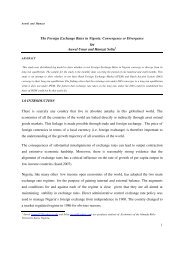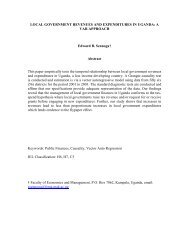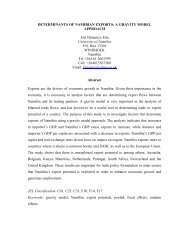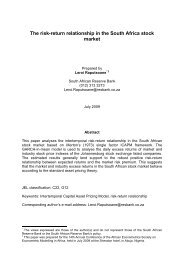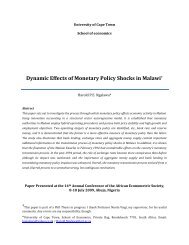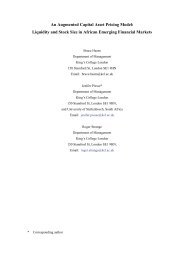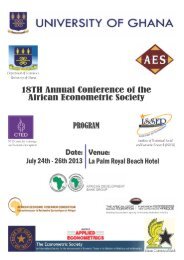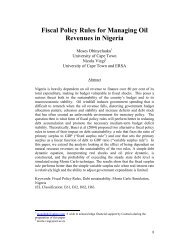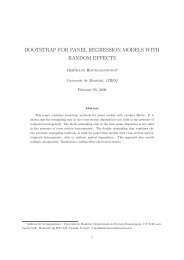Explaining Polarization and its Dimensions in Nigeria - African ...
Explaining Polarization and its Dimensions in Nigeria - African ...
Explaining Polarization and its Dimensions in Nigeria - African ...
You also want an ePaper? Increase the reach of your titles
YUMPU automatically turns print PDFs into web optimized ePapers that Google loves.
3.0. Data <strong>and</strong> household surveys<br />
Data used for this study were sourced from the 2004 World Bank assisted National Liv<strong>in</strong>g<br />
St<strong>and</strong>ard Survey (NLSS) collected by the National Bureau of Statistics (NBS). This survey was<br />
designed to provide estimate at both state <strong>and</strong> local government levels. A two-stage stratified<br />
sampl<strong>in</strong>g method was adopted. At the first stage, from each of the 36 states <strong>and</strong> the Federal<br />
Capital Territory (FCT, Abuja), cluster of 120 hous<strong>in</strong>g un<strong>its</strong> called Enumeration area (EA) were<br />
r<strong>and</strong>omly selected. The second stage <strong>in</strong>volved r<strong>and</strong>om selection of 5 hous<strong>in</strong>g un<strong>its</strong> from the<br />
selected EAs. A total of 600 households were r<strong>and</strong>omly chosen <strong>in</strong> each state <strong>and</strong> the FCT,<br />
summ<strong>in</strong>g up to 22,200 households <strong>in</strong> all (NBS, 2003). Prelim<strong>in</strong>ary analysis of the data shows<br />
that out of the 22,200 households that were targeted, only, 19158 completed the questionnaire.<br />
The NLSS consists of an <strong>in</strong>tegrated household questionnaire designed to collect data on multiple<br />
aspects of household welfare. This NLSS questionnaire among others covers the follow<strong>in</strong>g<br />
topics: household size; household consumption level; hous<strong>in</strong>g; education; employment <strong>and</strong> wage<br />
<strong>in</strong>come; health; agriculture; transfers <strong>and</strong> other non- labor <strong>in</strong>come. This is to say that the data set<br />
is sufficiently rich for this study. We choose consumption as our <strong>in</strong>dicator of well-be<strong>in</strong>g. Total<br />
consumption is estimated from the total household expenditure, other expenditure, money paid to<br />
the government, <strong>and</strong> other money spent. The approach of us<strong>in</strong>g per capita expenditure has been<br />
used <strong>in</strong> many studies on poverty <strong>in</strong> <strong>Nigeria</strong> (e.g. Canagarajah <strong>and</strong> Thomas, 2001). The study<br />
relies on the analysis of the national data based primarily on the six geo-political zones of the<br />
country. These zones consist of South-South, South-East, South-West, North-Central, North-<br />
East, <strong>and</strong> North-West which are well def<strong>in</strong>ed politically, territorially <strong>and</strong> culturally. These zones<br />
6



